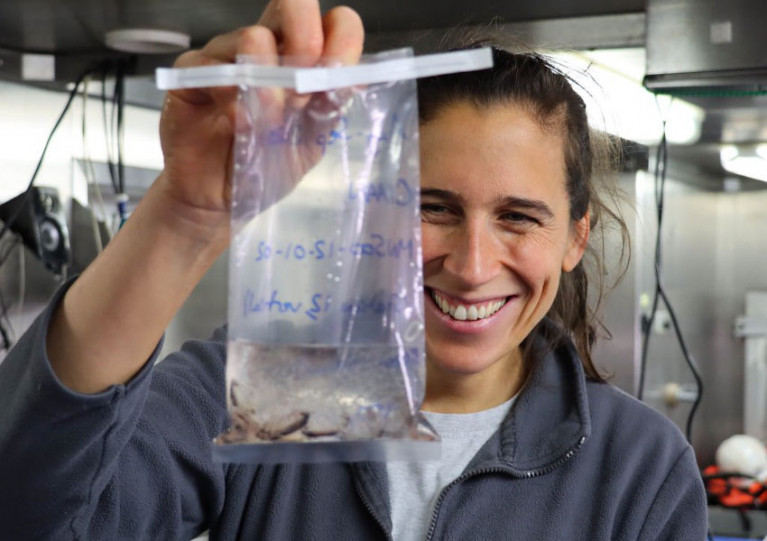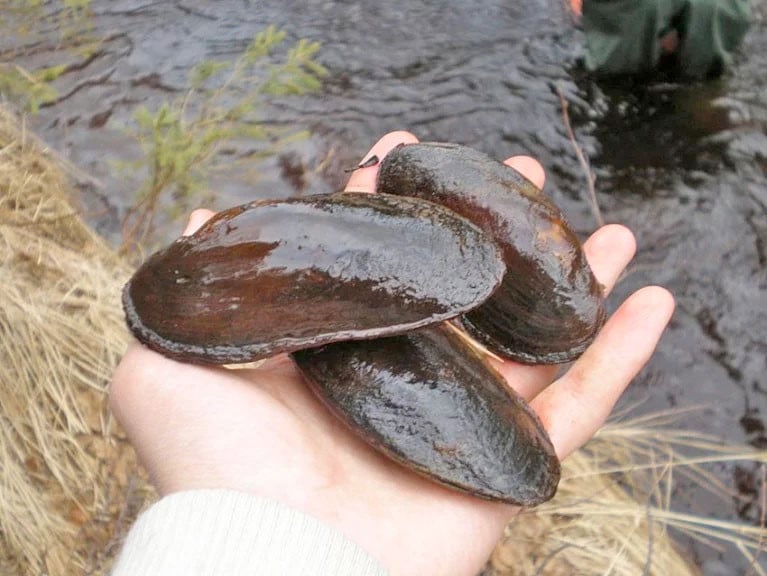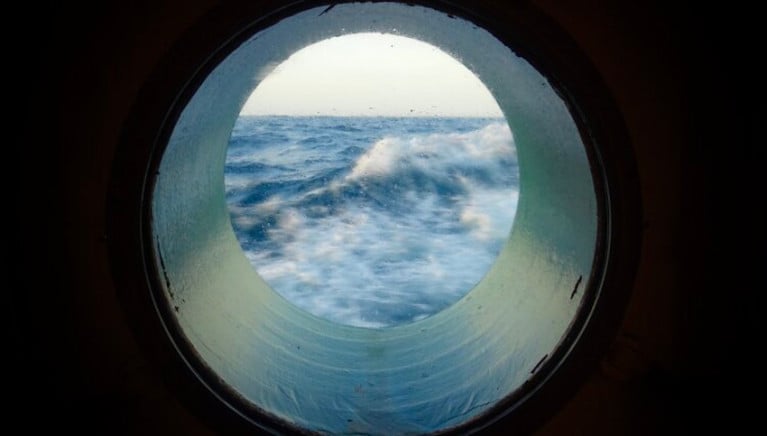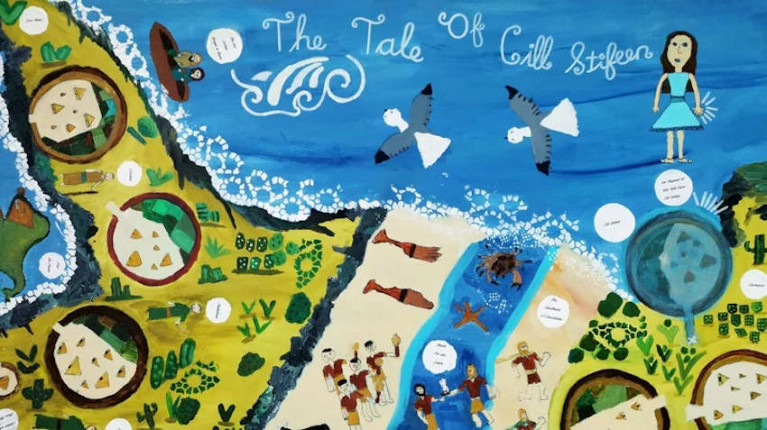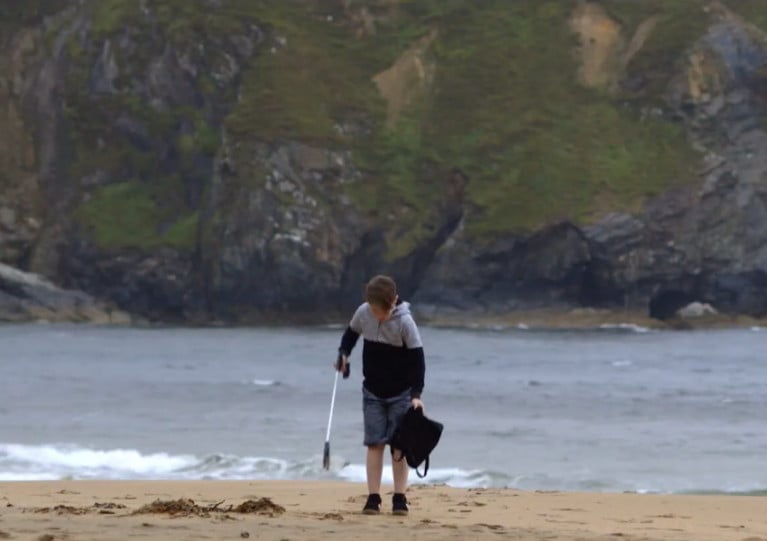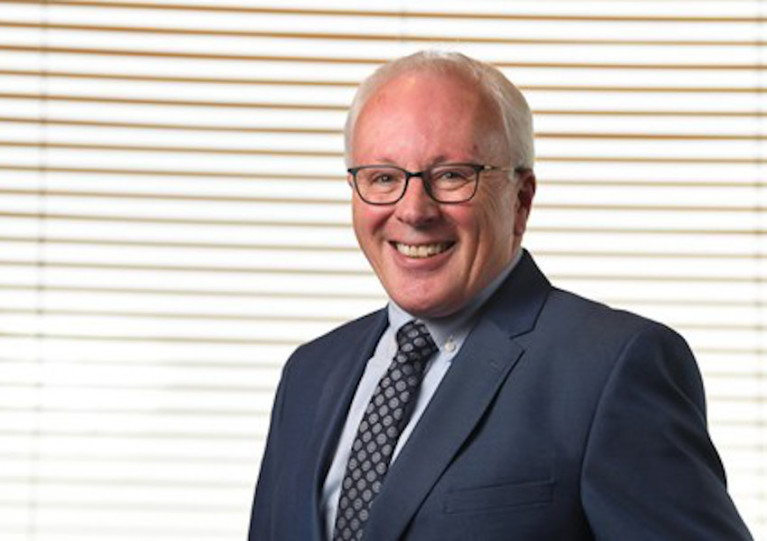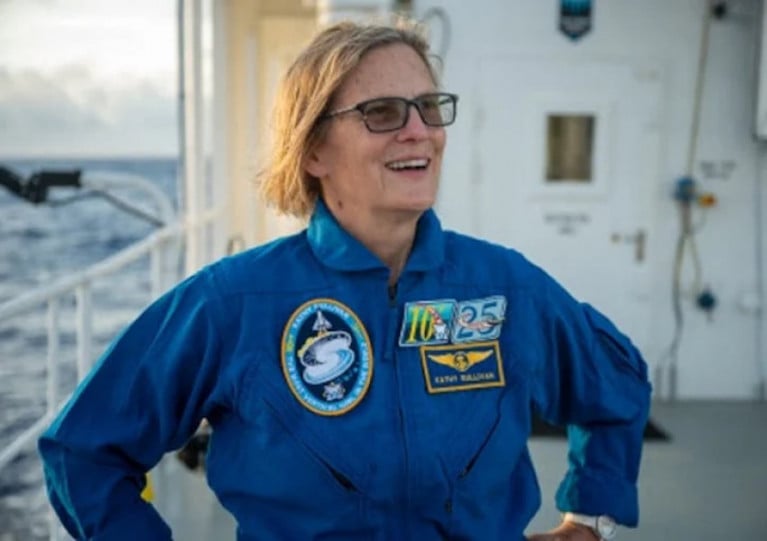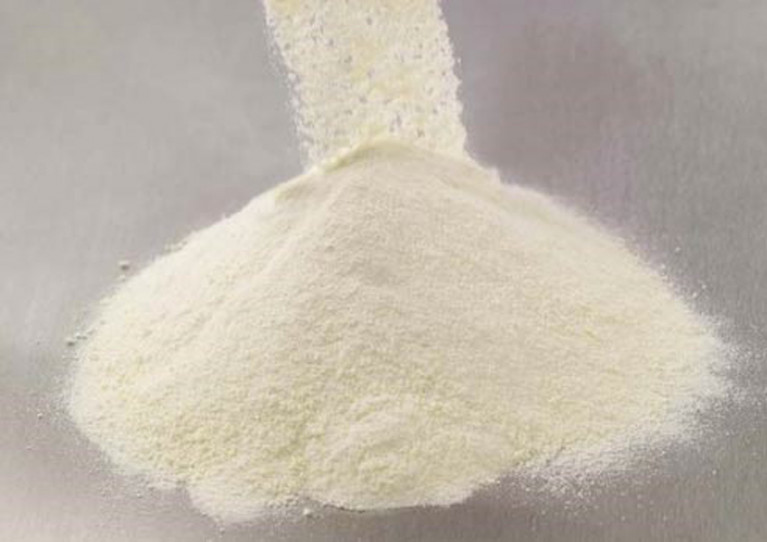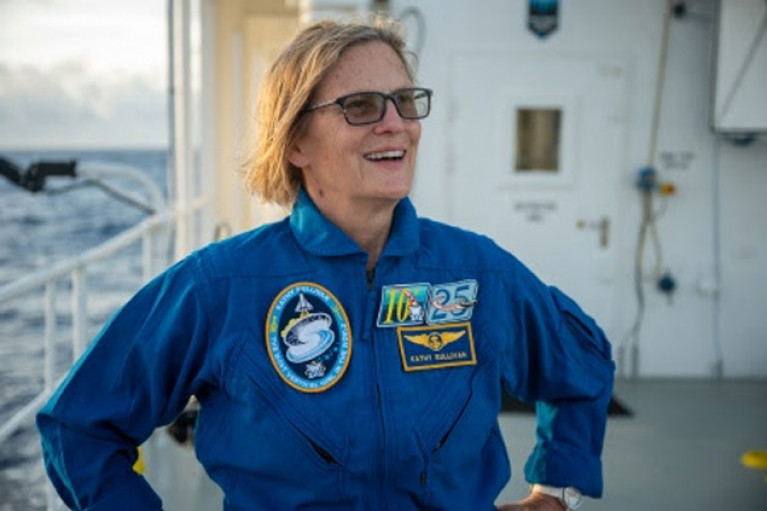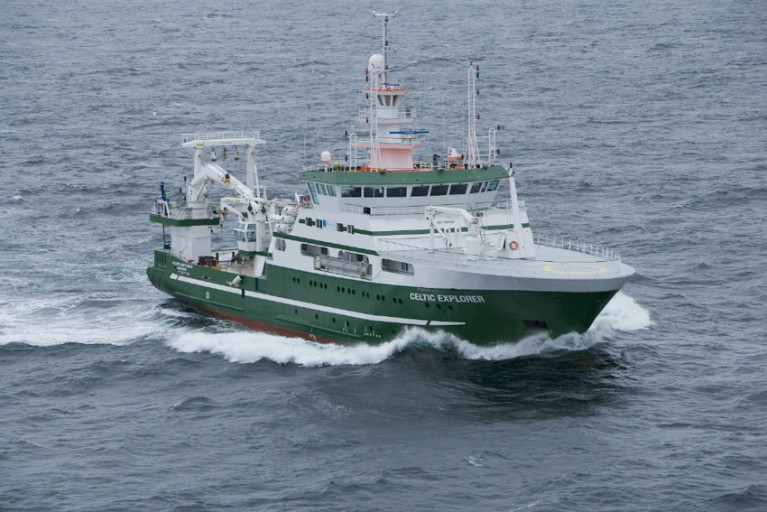Displaying items by tag: Marine Institute
Irish-Led Marine Science Mission Studies Past Climate Change To Predict The Future
An Irish-led team of marine scientists on board the RV Celtic Explorer returns to Galway Harbour today (Wednesday 16 September) after more than three weeks investigating historic climate change in the Arctic region.
Scientists from NUI Galway, University of Southampton, University of Bremen and Bergen University had been capturing data in the Nordic and Greenland Seas as part of the CIAAN survey (Constraining the Impact of Arctic Amplification in the Nordic Sea: A biogeochemical approach).
This survey aims to provide new insight into how essential climate variables are recorded in geologic archives.
Assessing the impact and magnitude of past (pre-industrial) climate changes is critical to further our understanding of how the climate system will respond to a rapidly changing Arctic ecosystem, the scientists explain.
‘One of the key challenges in climate change science is assessing the magnitude of future climate change’
Lead scientist Dr Audrey Morley, from the School of Geography and Archaeology at NUI Galway, says: “One of the key challenges in climate change science is assessing the magnitude of future climate change, due to our short observational records which are limited to the past 150 years.
“Our research is unique, as we are not only observing modern essential climate variables, but we will also look into the past to assess how essential climate variables have evolved since before pre-industrial conditions.
“This long-term perspective is crucial and will help us to better understand our environment and the environmental consequences of human activities.”
Dr Morley notes that the Arctic is an especially sensitive and vulnerable environment with regards to contemporary climate change.
“The North Atlantic and Nordic Seas are a key region for the formation of North Atlantic deepwater and the uptake of atmospheric carbon dioxide. Whether or not this region will remain a carbon sink during rapidly warming climates is a question that remains to be answered,” she says.
As part of this research survey, the RV Celtic Explorer travelled to 79 degrees north in the Greenland Sea, which is the highest latitude reached by the marine research vessel.
‘The RV Celtic Explorer is crucial to facilitate this type of international research’
In order to operate in the Arctic region, the RV Celtic Explorer was required to obtain a Polar Code Certification — becoming the first Irish vessel to achieve this status, which greatly increases its ocean research capabilities.
“The RV Celtic Explorer is crucial to facilitate this type of international research,” says Marine Institute chief executive Dr Paul Connolly.
“This research in the Arctic region will deepen our knowledge of the region and will improve models that can forecast changes to our oceans and climate. This will inform effective policy and management decisions to meet the challenges posed by climate change.”
New Breeding Programme Aims To Safeguard Rare Freshwater Pearl Mussels
A new joint initiative between the Marine Institute and the National Parks and Wildlife Service (NPWS) aims to revitalise the freshwater pearl mussel through a pilot captive breeding programme.
Pearl mussels are capable of surviving for up to 140 years, making them Ireland’s longest living animal.
But environmental changed have put them on the verge of extinction. The species is listed as Endangered on the IUCN Red List, and is one of the 365 most endangered species in the world.
In Ireland, 19 Special Areas of Conservation (SACs) have been designated in an effort to conserve the pearl mussel in its native habitats.
‘We are hopeful that over time this joint project will lead to a positive outcome for the freshwater pearl mussel in Ireland’
And the new programme — to be based at the Marine Institute’s Newport Research Facility in Co Mayo, close to one of the last remaining reproducing populations of freshwater pearl mussels — is hoped to safeguard the survival of the rare species into the future.
“Captive breeding programmes are already well established in several countries, and we are hopeful that over time this joint project between the Marine Institute and the National Parks and Wildlife Service will lead to a positive outcome for the freshwater pearl mussel in Ireland,” said Dr Áine O'Connor of the NPWS.
One of the reasons for the decline of the freshwater pearl mussel is the low survival rate among juveniles, which are extremely sensitive to slight changes in environmental conditions. This is leading to an ageing population, not capable of replenishing itself.
Juvenile survival is dependent on a clean riverbed, with little silt, sediment or algal growth. These mussels also have a very unusual life cycle, in that they are dependent on the Atlantic salmon and brown trout to host their larvae, called glochidia, for about 10 months. The captive breeding programme is targeted at this crucial life stage.
‘This small experimental population will be given a year to see if the juveniles grow to the stage where they can settle themselves in a suitable habitat’
Work on the programme began this past June when a tank in the Marine Institute’s hatchery was set up with 300 juvenile salmon. In July, 30 adult mussels were removed from the Newport River and transported to the tank.
The project team are currently waiting to see if mussels will release glochidia and whether these will naturally attach themselves to the gills of the salmon.
If successful, the Marine Institute and NPWS will maintain this small experimental population for a year to see if the juveniles grow to the stage where the mussels can detach from the fish and settle themselves in a suitable habitat.
“Historically, we know the Burrishoole catchment [in the area around Newport] contained pearl mussels, which gives us some confidence that the water supply to the hatchery on Lough Feeagh is suitable for long-term maintenance of the mussel populations,” said Marine Institute zoologist Dr Elvira de Eyto.
The pilot captive breeding programme is a partnership between the Marine Institute and NPWS in conjunction with freshwater pearl mussel specialists Evelyn Moorkens and Ian Killeen.
Connect With The Ocean Wilderness Via Art Project ‘Aerial/Sparks’ On Inis Oírr & Online
An art project involving multiple collaborators and many years in the making will soon invite the public to connect, both in person and online, with one of the last unknown spaces on earth — the ocean wilderness.
Aerial/Sparks was created by artist Louise Manifold as part of Galway’s European Capital of Culture programme for 2020, as previously reported on Afloat.ie.
Manifold brought together seven artists, writers and composers from across Europe who produced a series of standalone artworks for exhibition and radio broadcast, inspired by their experiences on research expeditions aoard the Marine Institute’s RV Celtic Explorer.
Inis Oírr, the smallest of the Aran Islands and with a deep-rooted maritime culture, is the setting for the Aerial/Sparks Art Trail from 11-27 September.
At just 3km long by 3km wide, the island can easily be traversed by foot to discover sound works housed in a lighthouse, the local church, an old handball alley and Áras Éanna, Europe’s most westerly arts centre.
Louise Manifold created Aerial/Sparks to explore the potential of radio communication to reimagine our relationship with the ocean
‘Garden Galway’ — a virtual programme of events for Ars Electronica 2020, the world-renowned festival for art, technology and society — will accompany the main exhibition from 9-13 September, and will include a series of conversations between artists and marine science experts.
Manifold created Aerial/Sparks to explore the potential of radio communication to reimagine our relationship with the ocean.
And each artist’s experience of ocean and water masses around Ireland and Europe has informed the production of individual works for audio and radio listening.
Highlights include author Kevin Barry’s ‘Island Time’, a monologue in nine chapters for a lovelorn lighthouse keeper as he dreams of distant lands, sited at Inis Oírr Lighthouse.
German composer David Stalling’s ‘Palace of Ships’ was created in collaboration with seismologist Sergei Lebedev, while visual artist Carol Anne Connolly’s acoustic portrayals of the ocean were inspired by the use of sound waves in acoustic mapping to create visuals of the sea bed.
Meanwhile, UK radio artist Magz Hall’s ‘Waves of Resistance’ is a broadcast created in the spirit of transnationalism, relaying a message of peace, hope and unity across all borders.
Manifold says Inis Oírr is the ideal home for these sound works.
“I wanted to find a place more than a space for this presentation, a place rich with silence, where organic and human sound floats and carries through the wind,” she explains. “I wanted each work to be experienced in a way that would connect with and charge our experience of place.”
Aerial/Sparks is the result of a long-term collaboration with the Marine Institute. Since 2017, artists from Ireland, Germany, England and Slovenia have taken part in seven ocean surveys and a passage from Galway to Hamburg on the RV Celtic Explorer, which the institute says is one of the few marine research vessels with sonic capabilities.
‘An innovative opportunity for artists and marine scientists to connect and engage with the wider community’
These expeditions have opened up "unique opportunities to foster connections between art and science", the Marine Institute says, as artists work side-by-side with scientists monitoring our marine biodiversity and human impact on the ocean environment.
“The collaboration between the Marine Institute and Aerial/Sparks has created an innovative opportunity for artists and marine scientists to connect and engage with the wider community through mediums such as art and music,” says Marine Institute chief executive Dr Paul Connolly.
“Using the concept of sound and the sea is a unique way of showing how both the arts and sciences can come together to highlight the value, opportunities and societal benefits of our ocean.”
Marilyn Gaughan Reddan, head of programme at Galway European Capital of Culture 2020, added: "Aerial/Sparks is a notable example of what a European Capital of Culture can bolster — new ways of thinking, new ways of working, new conversations and new partnerships.”
The Inis Oírr exhibition will be open from 11-27 September, Wednesday to Sunday between 11am and 5pm. For more information visit aerialsparks.org
‘Oceans Of Learning’ Now Featured By RTÉ Learn Online
RTÉ’s Learn web hub this week features content from the Marine Institute’s Oceans of Learning series.
The selection of videos, interactive activities and downloadable resources explores Ireland’s marine resource — with research topics from food to biodiversity, climate change, shipwrecks and seabed mapping, as well as the impact the ocean has on our health and wellbeing.
Marine Institute chief executive Dr Paul Connolly said: “We are delighted that RTÉ is bringing our Oceans of Learning series to a wider audience.
“By raising awareness of the opportunities and benefits provided by our ocean, we can inspire a new generation to safeguard and harness this valuable marine resource.”
Across the Oceans of Learning series, the Marine Institute works with the likes of the Department of Agriculture, Food and the Marine, Bord Iascaigh Mhara and Bord Bia, NUI Galway and the National Maritime College Ireland, Galway City Museum, humanitarian agency GOAL, Met Éireann and the Commissioners of Irish Lights, the ports of Cork and Galway, Seavite Skincare and Údarás na Gaeltachta.
“Thanks to the many partners who were involved in our Oceans of Learning series, providing resources and sharing information about the importance of our marine resource,” Dr Connolly added.
“In a challenging time, Ireland’s marine sector came together virtually to celebrate our world’s shared ocean with the people of Ireland.”
A new short film comes with a message that we can all ‘sea’ the future of Ireland’s ocean wealth together.
The video was launched by the Marine Institute as part of the final week of its Oceans of Learning programme, which has been celebrating our connection to the seas with a new marine research topic each week over the last 10 weeks.
The final week, One Shared Ocean, One Shared Future, had focused on the importance of local, national and international collaboration to explore and understand our marine resource.
“Our ocean is our greatest national resource,” says Dr Paul Connolly, chief executive of the Marine Institute.
“As a nation, Ireland made a strategic choice to develop a greater appreciation of its maritime heritage and of the opportunities presented by its 880,000 sq km marine territory.
“The Marine Institute’s work in co-ordinating and promoting marine research is essential for achieving a sustainable ocean economy, protecting ecosystems and inspiring a shared understanding of the ocean.”
He adds: “Looking to the future, there’s enormous opportunity for Ireland and its people to be engaged in ocean innovation and research — and what could be described as the last great exploration campaign on Earth.”
The launch bookends the final Oceans of Learning theme with last week’s special interview with former astronaut and now marine researcher Kathy Sullivan — the first person to visit both deep space and the furthest depths of the ocean.
This week’s Oceans of Learning topic, the final one in the 10-week series from the Marine Institute, focuses on partnerships between marine science, industry and education and how these can help ensure a healthy and sustainable future for our ocean.
Collaboration is one of the core values of the Marine Institute’s work — from mapping our seabed to policy support and scientific advice for the maritime sector, seafood safety monitoring services and funding marine research projects.
“It is vital to have a culture of open communication and a collaborative mind set with government, industry and other organisations in Ireland, to keep a focus on knowledge gap areas and new research requirements that will allow us to sustainably use and protect our ocean resource,” said Dr Paul Connolly, chief executive of the Marine Institute.
“Working on the international stage is also very important and is key to develop research programmes that deepen our understanding of the ocean and predict how it may change and impact on our island nation."
One of the Marine Institute’s key activities over the next 10 years will be the Europe-wide Mission Ocean, which focuses on restoring the health of our oceans, seas, rivers and lakes.
The goal of Mission Ocean is that by 2030 we will be focused on cleaning marine and fresh waters, restoring degraded ecosystems and habitats, and decarbonising the blue economy in order to sustainably harness the essential ‘goods and services’ that our oceans, seas, rivers and lakes provide.
“The ocean is our greatest natural resource. It provides us with the oxygen we breathe, provides us with food, influences our weather and climate, contributes to our economy, sustains our coastal communities and promotes our overall wellbeing,” said Dr Connolly.
“Understanding our ocean and providing the scientific advice for its sustainable use are central to the Marine Institute’s work and are key to our future.”
The week kicks off this afternoon (Thursday 23 July) with an exclusive Irish interview with Kathy Sullivan, the first person to ever experience travelling to both deep space and the furthest depths of the ocean.
Sullivan said: “We live on a very dynamic planet and need rich, detailed information to understand it. Whether it is in deep outer space or the inner deep of the ocean, it is important to be curious and explore our complex planet.”
Marking the closing week of the Oceans of Learning series, Marine Minister Dara Calleary said: “As an island nation, Ireland has a special relationship with the seas and oceans. The future of Ireland’s seafood sector and coastal communities will depend on the sustainable management of this precious resource…
“The Government also recognises the enormous potential that the ocean has to offer in tackling climate change and the need for further scientific research to understand and develop this potential.”
Resources for this week’s Oceans of Learning theme, One Shared Ocean, One Shared Future, are available from the Marine Institute website.
Don’t Miss History-Making Kathy Sullivan Talk ‘Extraordinary Exploration’ From Space To Sea Floor In Exclusive Irish Interview
The first person to experience travel to both outer space and the deepest part of the sea will be the subject of an exclusive Irish interview with Pat Kenny tomorrow, Thursday 23 July.
As previously reported on Afloat.ie, oceanographer and former Nasa astronaut Kathy Sullivan already made history as the first woman spacewalker in 1984.
But she doubled that achievement last month when she became the first woman to reach Challenger Deep — the deepest-known part of the world’s oceans at 35,810 feet below the surface.
As opposite as these two missions may seem, however, they both come from Sullivan’s passion to understand the world around her as much as possible.
Sullivan — who was also interviewed by Lorna Siggins for the Sunday Times this past weekend — will talk making history, exploring the frontiers of our world and more with Pat Kenny tomorrow, Thursday 23 July, as part of the Marine Institute’s Oceans of Learnings series.
The interview will be streamed live on the Marine Institute’s channels on Facebook, Twitter and YouTube from 2pm Irish time (or 9am EST in the US).
A fisheries science partnership previously touted as a ‘game changer’ in the field of marine food is developing new health supplement based on fish protein from blue whiting.
Bio-Marine Ingredients Ireland (BII) is preparing to begin clinical trials of its soluble protein hydrolysate power, which it’s hoped could improve muscular health among the elderly.
“We are one of the first companies globally to take under-utilised raw fish materials and transform them into powders suited to applications for human nutrition,” said Dr Snehal Gite, senior research and development technologist.
“At BII, we are processing a low-value blue whiting fish into a high value nutritional ingredient which could offer enormous benefits for skeletal health in older people.
“The outcome of this research project could see BII enter a valuable global market, which will ultimately benefit Irish fishermen, industry and the associated supply chain.”
Research on this potentially health-boosting supplement is featured in this week’s Oceans of Learning series from the Marine Institute, which looks at the ocean and its connection to human health and wellbeing.
The work of the National Marine Biodiscovery Laboratory of Ireland (NMBLI) is also in focus, as a number of new natural products with potentially powerful properties have been found in Ireland’s waters in recent years.
“Our ocean could offer a treasure trove of cures,” said Joe Silke, director of marine environment food and safety Services at the Marine Institute.
“With so much of our marine habitats yet to be explored, and an ever-changing marine environment … Ireland’s ocean wealth is still to be uncovered.”
Videos, interactive activities and downloadable resources are available from the Our Ocean: Our Health and Wellbeing portal on the Marine Institute website.
Kathy Sullivan's Exploration From Space to the Sea Floor
The Most Vertical Girl in the World. The woman who's made history in sea and space; The astronaut, oceanographer, explorer, author and the first person to ever experience travelling to both deep space and the oceans deep.
Kathy Sullivan is already in the history books as the first American woman to walk in space in 1984, the 68-year-old found herself making history again just last month.
On June 6, the oceanographer and former NASA astronaut became the first woman to reach Challenger Deep, the deepest known location in the ocean.
The 35,810-foot dive, which was undertaken on the DSV Limiting Factor and co-piloted by Victor Vescovo, now makes Sullivan the first person to both walk-in space and descend to the deepest point in the ocean.
The two missions, total opposites in the minds of many, for Sullivan, come from her one simple desire: to understand the world around her as much as possible.
Join Kathy Sullivan in an exclusive Irish Interview with broadcaster Pat Kenny where she will share her remarkable history-making story, offering unique insights into her exploration at the extreme frontiers, recalling the experiences of walking in space and charting oceans.
You can tune into the Kathy Sullivan in Conversation Livestream on any one of the Marine Institute's social media channels on Thursday, 23 July at 2 pm IST and read Lorna Siggins' interview with Sullivan in The Sunday Times, this week, July 19th.
Surface ocean carbon dioxide observations collected by the Marine Institute’s RV Celtic Explorer have been published in the 2020 version of the Surface Ocean Carbon Atlas (SOCAT).
These data provide scientists, climate researchers and international policy makers with essential information on ocean carbon dioxide measurements.
About 36 billion tonnes of carbon dioxide are added to the atmosphere each year as a result of human activities. The ocean absorbs about one-quarter of these emissions, which helps to slow down climate change by removing CO2 from the atmosphere.
However, absorbing additional CO2 increases the acidity of seawater. This process is known as ocean acidification, and it could have dramatic consequences for marine life.
The impacts of ocean acidification would extend up the food chain, threatening food security for millions of people
If sea water is too acidic, it can make it difficult for marine organisms such as coral, oysters and mussels to form shells and skeletons.
Ocean acidification may impact some plankton species, which form the base of marine food webs and would impact larger animals like fish and whales.
The impacts of ocean acidification would extend up the food chain, affecting fisheries and aquaculture, threatening food security for millions of people, as well as the tourism industry.
Ocean acidification is a global problem. The European Union has committed to cut its greenhouse gas emissions by at least 40% below 1990 levels by 2030 and aims to be climate-neutral — an economy with net-zero greenhouse gas emissions — by 2050.
To understand the Earth’s changing climate, it is essential to collect high-quality data on surface ocean CO2 levels.
Since 2017, the Marine institute has been measuring dissolved carbon dioxide (pCO2) in Irish and Atlantic surface waters using a General Oceanics pCO2 system on board the RV Celtic Explorer. This system enables near-continuous and high-accuracy carbon dioxide measurements in surface water and the atmosphere when the vessel is at sea.
The close collaboration between the Marine Institute and P&O Maritime Services, with support from GEOMAR in Germany, has resulted in the successful collection of this data.
SOCAT has become a milestone in research co-ordination, data access, climate research and in informing policy
The high-quality measurements of CO2 collected by the Marine Institute are now included in the 2020 version of the Surface Ocean Carbon Atlas (SOCAT) and fill “a notable data gap”, according to the Irish State agency for marine research.
The Marine Institute submitted data from nine surveys in 2017 and a further 15 surveys in 2018 to SOCAT, whose data set os used globally by climate researchers and contribute to the work of the Intergovernmental Panel on Climate Change (IPCC).
SOCAT has become a milestone in research co-ordination, data access, climate research and in informing policy, the Marine Institute says.
And this work further contributes to collaborative research on ocean carbon and acidification undertaken over the last decade by the institute and NUI Galway.
Margot Cronin, chemist at the Marine Institute, said: “Measuring carbon dioxide in Irish and Atlantic waters provides essential data that increases the understanding of our oceans and climate.
“The Marine Institute is contributing to global science, providing advanced scientific knowledge which will help inform policy and our response to a changing ocean.”
As previously reported on Afloat.ie, the Marine Institute’s latest Oceans of Learning series focuses on our changing ocean climate with videos, interactive activities and downloadable resources.


























